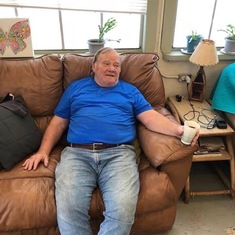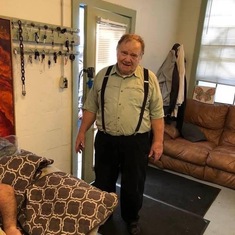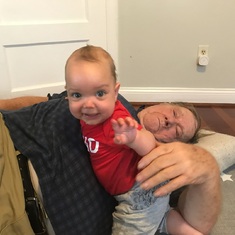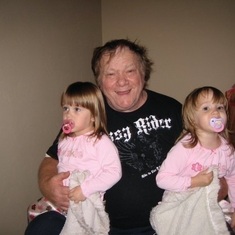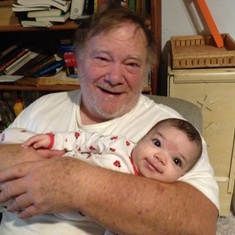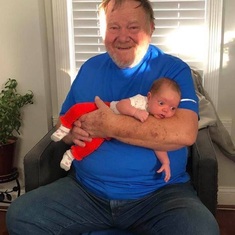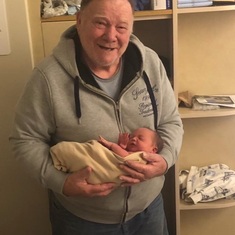This memorial website was created in memory of our loved one, Clarence Coonce, 78 years old, born on June 12, 1942, and passed away on February 8, 2021. We will remember him forever.
On February 8th 2021, misfits across America lost a childhood hero, and history gained a defiant philosopher. Clarence Wesley Coonce, Jr.—Wes to his friends, Claire to his wife, Junior to his parents, Papa Coonce to neighborhood children, Papa Pete to his grandchildren, and
paterfamilias to us all—drew his last breath, asleep in his bed, lying next to his wife Elizabeth as she reached her hand out to touch the expanse of his back. He was not known by millions or even thousands, but the hundreds who did know him will never forget him.
Wes inspired in those he met sometimes awe and reflection, other times joy and raucous laughter, the rest of the time the urge to smack the shit out of him. But whatever he inspired, it was always intense, urgent, and a matter of life and death. He questioned everything, and taught those around him to do the same. Even when debaters disagreed with him, they always came away changed.
No stories about Wes can be written successfully, for he is an unbelievable character: a philosophizing migrant worker, a country-living computer programmer, a swindling PhD student, a conspiracy theorizing Mensa member, an outlandish, bombastic, adventure-seeking, prank-plotting, Elvis-wailing, tall-tale-spinning, dirty-joke-telling, dancing buffoon who spent his life contemplating the meaning of human existence. He lived many lives over the course of his 78 years, and he nailed every one.
On June 12th, 1942, in Indianapolis, Indiana, Wes was born an independent thinker to Lula Belle and Clarence Coonce Sr., and became the head of what would become a nine-person household. His three sisters—Joan, Patricia, and Beetress—and his three brothers—Richard, Raymond, and Victor—looked to their eldest brother to guide them. And guide them he did. He taught them that they didn’t have to settle for the poverty-stricken, calamity-filled cards they had drawn at birth, but that they could instead choose the fantastic. They could be heroes, with kitchen knives for spears, sticks and rubber bands for slingshots, hunks of metal for arrowheads, nails for bullets, and jars of dry ice for bombs. Sewer snakes could be their calvary, and baby alligators their allies. He turned their suffering into a game, gave them hope where there was none: he helped them survive.
In the fall of 1960, Wes left his siblings to join the wayward souls of the Third Army Infantry battalion in Wildflecken, Germany for three years, where he channeled his independent mind into relentless rebellion—defying direct orders and thumbing his nose at commanding officers until he was banished to a hole in the ground to feed coal into the mess hall furnace for the remainder of his station. He was honorably discharged as a Private First Class in 1963, narrowly avoiding leaving the army at the same level in which he had entered it as a result of so many disciplinary actions. He saw it as a win.
After the Army, Wes began his Odyssey across America, from Georgia to Indiana to Texas to Florida, purportedly making a million dollars along the way, though he despised money and could at the height of his income be seen giving hundred dollar bills away to neighbors in need. Rather than serving a boss for someone else’s profit, Wes taught himself TV Repair and computer programming, he became a pool shark and coin trader, he taught himself to sing and to cook.
He loved to cook when it could be sensational. He made waffles just like Waffle House and pancakes just like IHOP, cole slaw just like KFC and pizza just like Pizza Hut, authentic tamales and White Castle sliders. He loved to sing no matter what: songs from his childhood from the driver’s seat of his car, Elvis hits and Burl Ives classics from the stage of a Karaoke bar, or the latest radio tunes supine on the living room floor. Singing soothed his inquisitive soul, providing answers where there seemed to be none.
But Wes’s one true love was education. The act of learning was the only place he felt at home. There, his natural rebellion became questioning, his insatiable longing became a quest for knowledge, his love of the fantastic became the joy of discovery. His love for education thrived from the day he started first grade in 1949, to the day he completed his classwork in pursuit of a PhD in 2002, to the days just before his death, when he reminded himself aloud to reread Plato’s Republic, so that he could settle for himself once and for all whether Socrates’ forms were in fact one and the same with the concepts linguists believe are the basis of all human language. Wes studied linguistics, eduction, and philosophy, earning his Bachelor’s Degree from Armstrong State College, and two Master’s Degrees from Houston University and the University of Florida.
Wes shared his passion for learning through the teaching and mentorship of every person he met, including the students of Bradford High School, adult immigrants seeking English lessons in Texas, and the members of the Hawthorne First United Methodist Church; but most especially the neighborhood children who visited his own children over the course of his life. Misfit teenagers for miles around flocked to Wes’s house, where they found a safe haven from judgement, acceptance of whoever they wanted to be, and solace in a lack of conventions of any kind. Children loved Wes’s wild heart, and they marveled at his willingness to talk with them for hours about any subject that interested them. They saw reflected in him their own childlike wonder and awe for the world. On any given day, Wes could be found studying at his computer, cooking elaborate meals in the kitchen, or crawling around on the floor for a game of Murder in the Dark.
Second only to Wes’s love of education was his devotion to his family. In addition to his six brothers and sisters and Aunt Eva Wilburn, Wes had three sons: Clarence Wesley III, James Richard, and Stephen Wesley; three daughters: Jennifer Ann, Megan Marie, and Rachel Rebecca; and seven grandchildren: Jessie Laura, Shelby Elizabeth, Olive Amelia, Eleanor Ann, Philippa Elizabeth, Jordan Lynn, and Gabriel Jacob. He taught every one that members of a loving family challenge one another—unafraid to hurl an insult or even throw a punch—but never hold a grudge. Family should always be ready to come together for a karaoke party, a philosophical debate, or a game of poker.
In the latter part of his life, Wes began to feel misunderstood, as his philosophical mind turned to questioning the veracity of his everyday existence and the motives of people in power. He believed it was his responsibility to educate and protect his family as he had always done, but this time from what they believed to be imagined threats. And as his mind turned to darker concerns, he grew more isolated and further from the family he so adored. But then he discovered writing, and in it a new way to connect with his loved ones.
“I consider writing a chance to get closer to all my kids,” he said. “And anyone who has read anything I’ve written so far has gotten closer to me.” After several failed attempts over the years, Wes finished his 443 page memoir on December 9, 2020 and received a hardback copy in the mail days before his death. “It’s amazing to hold it in my hands,” he said. “I feel like… I really did it.”
Would Wes want to be remembered as an adventurer as great as Odysseus, or a philosopher as bold as Diogenes and as wise as Socrates? Would he want to be remembered as an entrepreneur millionaire or a misunderstood prophet that Cassandra herself would weep for? Would he want to be considered the greatest writer since Shakespeare? He may have wanted all of these, but in the end became none. He will be remembered as one of a kind, one among the greats, Clarence Wesley Coonce, Jr.
As Wes lay on his death bed, suffering from complications of COVID-19, and phone calls peppered his home from loved ones near and far, he, like Socrates, said to his followers as they wept for him and cajoled him to stay in this world a little longer, “What is this, you strange fellows? This is why I sent the women away! To avoid such unseemliness! For I am told one should die in good omened silence.” And so he told his wife to silence the calls, lay down to sleep, and died in peaceful silence.
You can view a slideshow of his life while it's available at:
https://www.dropbox.com/s/pwmz4yp7xsyowzh/Clarence...

